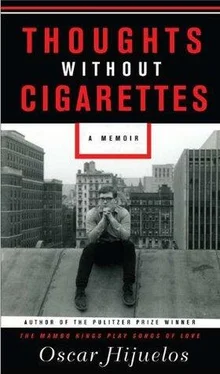Those evenings slipped one into another, without a lot of variation: Once night fell, the unused rooms were kept dark, to save money, I suppose; after dinner, which Cheo improvised over a hot plate or small stove, my cousins serving, we’d listen to the radio. That was a big deal in those days, and very exciting, for most programs, featuring popular music, were beamed in from Havana — acts like El Trio Matamoros (the “moor killers”) and singers like Olga Guillot and Beny Moré, among so many others, as well as soap operas and comedies. (And to impose my future knowledge about something I would have hardly been aware of back then, the news bulletins would have occasionally been about the rebel forces of Fidel Castro, then encamped in the Sierra Maestra some fifty miles or so to the south.) Sometimes, we’d join our other cousins, Cuza, Bebo y Macho, y Gladys, María’s offspring, and go strolling along those streets, to congregate, as so many other Holguíneros did, in the nearest plaza, where a municipal band might be playing and where a stand sold freshly made papaya and coconut-flavored ice cream. (“How you loved your sweets!” my mother would tell me.)
I do recall playing in a small park nearby, El Parque Infantil, where there were swings, and that I’d go there with my cousin Miriam, who, as she has told me a thousand times since, treated me like her little muñeca , her blond-haired doll; we also slept side by side sometimes, but the only telling anecdote I know of our time together comes down to something she recently told me: Along that street stood a pepper tree, which I always picked at as if the hanging brilliantly red peppers were lollipops, and that I constantly ate them even when I was told not to, to the point that my lips burned so much that my cousin had to coat them over with honey — I was just that way, and if I take satisfaction in saying so, it’s because such a detail reminds me of the fact that, once upon a time, I was a Cuban.

Altogether, life in Cheo’s household unfolded peacefully and without much happening at all, though one evening, I must have been dozing in my aunt’s front room, which was her sala, whose door opened to the street, and as I happened to look over, I saw my mother and Aunt Cheo holding each other. Perhaps it is a caprice of memory, but one of them was crying on the other’s lap — perhaps my mother, lamenting her life in New York, or, remembering his good traits, simply missing my father and wondering what might have gone wrong between them, or if she’d done the right thing marrying him. Or perhaps it was Cheo — with her bottled-up widow’s grief and feeling the burdens of her responsibilities and of her own kind of Catholic loneliness, for she would wait her entire life to be reunited in eternity with her husband — who needed her sister’s comforting. To be honest, I can’t recall just which of those Torrens women felt like falling to pieces that night — or perhaps they both were — but that blurred memory, from so long ago, has stayed with me just the same.
Now, Holguín, unlike the far more raucous city of Havana, shut down completely at about ten at night, with such stillness that a raised voice from some dwelling a block away could be heard, and, after a while, the cicadas took over. In my bed, which I shared with my mother and sometimes my aunt, I waited for the dense midnight humidity and heat to lift — it was a Cuban summer after all — and yet, finally closing my eyes, after tossing in sweat, I’d just as soon awaken to the somewhat cooler morning and rooster calls, and carts and hawkers passing by on the street, cans and bells clanging, ever so happy to do what I, as a young boy, was prone to do, which was to eat and eat things like sugar-covered pieces of bread fried in lard and to sip from my own cup of heavily sweetened café con leche . Occasionally, as a special treat, my aunt boiled up a pot of condensed milk, to which she’d add an exotic and deliciously nutty flavoring, so deep and dark that for years, well into my twenties, I wondered just what that magical “Cuban” drink had been. It was one of the tastes I most vividly — and fondly — remembered from my stay in Holguín, and I truly became convinced that its Cuban origins were what made that drink so special, as if its uniqueness had been distilled from some obscure roots in the deepest jungle; this was an illusion I held on to until the day came when my mother, breaking that spell of decades-old nostalgia, advised me that my magical Cuban elixir, something I believed had come from heaven and considered better than honey and cinnamon and all the sugars in the world combined, was nothing more than Borden’s milk mixed with a few tablespoons of Hershey’s syrup.
Along the way, I spent time with my Majorcan-born abuelita , who, with sunken but sweet eyes and skin nearly translucent from age, wore her gray hair tied back tautly over her head, in the formal Spanish style. She lived with her oldest daughter, my aunt María, and if there was anyone from whom Cheo derived her gentle and saintly character, it was surely her mother. The sort to sit in a corner and take in things quietly around her, as if contented with a kind of invisibility, she’d suddenly reach her hands out to grab me if I were passing by, just to request a kiss—“ Dame un besito! ”—my abuela ’s face, so solemn before, softening with happiness. It was in her company that my mother seemed most tranquil; they sometimes shared a bench by the window in the front parlor — I can remember my abuela , bathed in sunlight, always sewing some garment — and while they would speak softly about missing each other (perhaps) or of matters concerning my abuela ’s frailness, for she was not in the best of health (perhaps) or of plans to visit my grandfather’s grave together (definitely, for, indeed, they went to the cemetery one day), what I can mainly recall is how my abuela treated her second-eldest daughter with utter tenderness, sometimes reaching over to gently touch her face and say, “Oh, but my darling Magdalencita.” What my mother felt just then, I can’t say, but she always behaved around her with reverence and humility and gratitude, as if to show Abuela María that she, indeed, had outgrown the spoiled ways of her youth. She, in fact, never seemed as much at home as she did in those days with her mother in Holguín. (But that’s all I can recall about her, my mother’s “ santa Buena ” and how they were with one another.)
Now, her namesake, my aunt María, aside from the fact that she bore a strong resemblance to my mother in a way that the gentle Cheo, with her teaspoon-shaped face and sweet smile, did not, I can’t remember at all, though her husband, Pepito, remains vividly with me. And not because he was much beloved in the family and known as a good provider and a patriarch, but because he carried me about his country place, a farm, and just about everywhere else we went, on his shoulders. A bookkeeper in Holguín, he had a longish face, intensely intelligent eyes, and a manner that was both serious and warm. He wore wire-rim eyeglasses. (Years later, a balding priest I once saw meditating in a garden in Rome reminded me of him, as if Pepito had returned as a ghost.) One of those Cubans who, never caring for baby talk, always spoke to children as if they were adults, it’s to Pepito that I owe one of the few statements that I can actually remember word for word: “ Sabes que eres cubano? No te olvides eso ,” he told me one day when he had taken us up to a beach near Gibara, along the Atlantic coast. “You know that you’re Cuban? Don’t forget that.” That afternoon at the beach, when he had taken off his guayabera , the flowing crests of white hair gushing from his chest astonished me. Later, as he carried me into the ocean, I may as well have been riding upon the shoulders of a silver-haired faun, his fur matting in the foam. Laughing and grabbing hold of my arms as I desperately tried to hang on to his neck, Pepito, waist-high in the Cuban sea, began to swing me around in circles, the horizons of both ocean and land spinning around me. I was reeling dizzily when he set me down into the water just in time for a high wave to come crashing over us: another taste, of burning salt water, like brine, in my throat, my thin arms grasping his legs (bony and hairy as well) for dear life, until he hoisted me up once again into the safety of his embrace, Pepito patting my back as I trembled with relief.
Читать дальше













